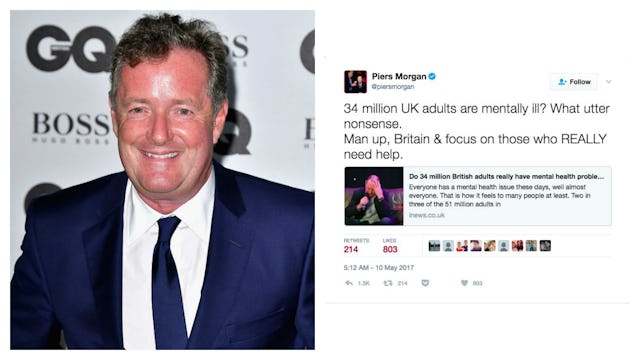Piers Morgan Tweets 'Man Up, Britain' In Response To Mental Health Statistics

According to a new study from the U.K.’s Mental Health Foundation, 2 out of 3 Britons say they’ve experienced a mental health issue. Responding to the study published on Monday was Piers Morgan, who doubted the notion that 34 million people in the U.K. could have experienced a mental illness.
“34 million UK adults are mentally ill? What utter nonsense,” Morgan tweeted. “Man up, Britain & focus on those who REALLY need help.”
Morgan also shared his opinions about mental illness on Good Morning Britain. Speaking with Stan Collymore, a U.K. footballer who has been open about his experience living with depression, Morgan said:
“I just read a report, yesterday, by, I think The Independent…medical expert, saying maybe 35 million people in Britain suffer some form of mental illness. To which I say, nonsense. There are lots of people that do, and they must be taken seriously, they must get treatment and they must speak to friends and family and when necessary medical experts. Let’s just put that on the table. But, it seems to me a lot of people in this modern era now, are being led into the thought process that every part of life’s travails – the normal rough and tumble of life – has to now be categorized as mental illness. And I don’t think that’s helpful either.”
“The whole point about mental health week, the whole point about speaking up and talking out about mental health issues,” Collymore told Morgan, “is that you shouldn’t have to man up, sit there, have a stiff upper lip. You should, at the appropriate time, if you are struggling, go to your doctor, speak to a friend.”
While Morgan agreed with several of Collymore’s points, the media personality continued by stating there shouldn’t be a stigma against those who approach their mental illness by “manning up.”
“What happens is when you are kept told by whether it’s Piers Morgan or whether it’s somebody on Twitter, ‘Man up, it doesn’t exist,’ is that rather than encouraging somebody to speak up on day one when they’re struggling is that on day 20,” Collymore explained sharing the story of a fellow footballer who died by suicide. “We don’t want people to get to that state.”
This isn’t the first time Morgan has shared his opinion regarding mental illness.
Dozens of people have replied to Morgan’s tweets, many of whom shared how Morgan’s position keeps people living with mental illnesses from getting the help they need.
Update: Responding to Morgan’s tweet, Mark Rowland, director of communications for the Mental Health Foundation, told The Mighty:
If most Britons reported that in their lifetime, they had experienced a physical health problem, would we be so quick to question their integrity? Would our response be to tell them to ‘man up’?
Piers Morgan will be on the wrong side of history on this issue. We have tried the ‘man up’ mantra for generations, and we have ended up with suicide being the leading cause of death for men under the age of 45 in this country.
Our research is entirely consistent with previous mental health statistics for government, such as 1 in 4 people experiencing a mental health problem in any given year (or 1 in 6 in any given week). Our data shows that two out of three adults have experienced a mental health problem in their lifetime. Like physical health, mental health problems range in severity, and of course support should be concentrated where most needed, but common mental health problems like anxiety and panic attacks are real conditions that cause significant, life debilitating effects.
We believe that people can be trusted to know their own emotional and mental health. Too many people have suffered in silence for too long.
We stand by the fact that two out of every three adults in Britain, have faced a mental health problem in their lifetime. This could be the generation that finally acknowledges the need for change.